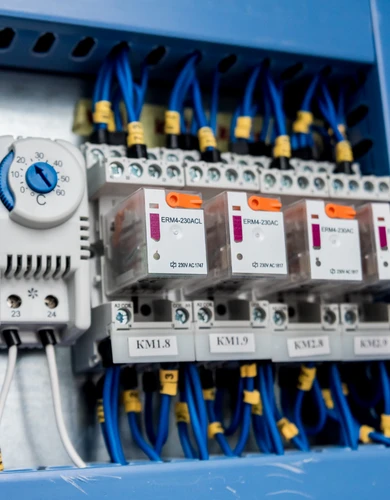Smart Export Guarantee tariffs for businesses
The Smart Export Guarantee (SEG) is a UK government initiative that allows businesses and homeowners to earn payments for exporting surplus renewable electricity to the national grid.
By incentivising the adoption of renewable technologies, the SEG plays a pivotal role in the UK’s journey towards achieving net zero.
The benefits of participating in the SEG are substantial, as it provides a new revenue stream and enhances the return on investment for renewable installations.
In this guide to the Smart Export Guarantee for businesses, we cover:
- How the Smart Export Guarantee works
- Smart Export Guarantee rates
- Eligibility for the Smart Export Guarantee
- VAT on Smart Export Guarantee payments
- Benefits of the Smart Export Guarantee
How the Smart Export Guarantee works
In this section, we explain how Smart Export Guarantee suppliers and payments work and provide a step-by-step guide to setting up your Smart Export Guarantee tariff.
The Smart Export Guarantee operates similarly for homes and businesses, but this guide focuses on providing the best advice for businesses seeking to use the Smart Export Guarantee scheme.
Smart Export Guarantee suppliers
The Smart Export Guarantee scheme offers a convenient way to sell power directly to your electricity supplier.
Larger renewable energy generators typically sell their power through Power Purchase Agreements on the wholesale market, but this process is too complex to be viable for most businesses.
Ofgem licensed energy suppliers with more than 150,000 customers are required to offer Smart Export Guarantee tariffs, while smaller suppliers have joined the scheme voluntarily.
Suppliers have the flexibility to decide how they price their SEG tariffs. We have compared the export rates offered by different suppliers below.
Measurement and payments
Typical Smart Export Guarantee setups use a smart meter that measures both imported and exported electricity, transmitting this data to your supplier every 30 minutes.
Smart Export Guarantee tariffs include an export electricity unit rate for each kWh of power fed back into the grid.
Payments are usually made quarterly by your supplier, with the export payment calculated as follows:
SEG payment = Power exported in quarter (kWh) × SEG unit rate (£/kWh)
Registering with the Smart Export Guarantee
Once you have an eligible renewable energy generation system installed (see criteria below), follow these steps to sign up for a Smart Export Guarantee tariff:
1. Choose a business energy supplier offering export tariffs
While it is possible to have one supplier for import and another for export, business energy suppliers often provide their best rates when they hold a business energy contract for both elements.
Find the best combined rates by comparing business electricity rates using our free, no-obligation business energy comparison service.
Combining the Smart Export Guarantee with a green business energy import tariff is the most effective way to achieve an entirely net-zero power supply.
2. Onboarding to your SEG tariff
Business energy suppliers will require MSC certification for your renewable system and installation as part of the onboarding process. Upon acceptance, your supplier will request an import MPAN from your regional distribution network operator.
Additionally, your supplier will ask for your corporate bank details to facilitate quarterly payments for exported power.
3. Start exporting to the grid.
Your supplier will confirm when they begin receiving automatic readings from your business electricity meter.
You will receive quarterly statements showing the amount of power you have exported to the grid (in kWh) and the total revenue you have earned.
Live tracking of energy exported to the grid is possible with business energy monitoring software.
Smart Export Guarantee rates
The 13 licensed energy suppliers registered with the Smart Export Guarantee scheme publish their SEG tariff rates on their websites.
Our energy experts have summarised the tariffs currently being offered by each supplier.
💡 We’ve only shown rates for business energy suppliers, excluding those that only provide energy products to domestic customers.
| Energy Supplier | Published rates | Term | Notes |
|---|---|---|---|
| British Gas Business Energy | 15.1p/kWh | Variable, no exit fees | Tariff exclusive to British Gas customers. British Gas also offers a 3p/kWh tariff to any SEG-eligible business. |
| E.ON Business Energy | 16.5 p/kWh | 12 month fixed term | Tariff exclusive to E.ON customers and only available for generation capacities up to 15kW. E.ON also offers a 3p/kWh tariff to any SEG-eligible business. |
| EDF Business Energy | 15.0 p/kWh | 12 month fixed term | Tariff exclusive to EDF customers. Rates are fixed for 12 months but have no exit fee. |
| Utility Warehouse | 8.0 p/kWh | Standard variable | Available to any business that takes two or more additional services with Utility Warehouse. They also offer a 2p/kWh contract with no restrictions. |
| Octopus Business Energy | 4.0 p/kWh | Variable, no exit fees | Octopus also offers a dynamic pricing SEG tariff where businesses with a battery system can export electricity at peak times to earn more from the SEG. |
| Scottish Power Business Energy | 12.0 p/kWh | Variable, no exit fees | Scottish Power does not impose any requirement to be an existing customer. |
| Utilita Business Energy | 3.0 p/kWh | Variable, no exit fees | Utilita does not impose any requirement to be an existing customer. |
Data sourced: April 2025.
In collecting our data, we have excluded tariffs that require you to purchase solar equipment directly from the supplier.
💡 The Smart Export Guarantee rates are all lower than the export business electricity prices currently available on the market, which are approximately 20-25p/kWh.
Eligibility for the Smart Export Guarantee
In this section, we summarise the three most important eligibility criteria for exporting power to the grid under the Smart Export Guarantee scheme.
Renewable energy technologies
To qualify for the Smart Export Guarantee scheme, power generation must come from one of the following renewable energy technologies:
- Solar Photovoltaics (up to 5MW)
- Wind turbines (up to 5MW)
- Micro-CHP (up to 50 kW)
- Hydroelectric systems (up to 5MW)
- Anaerobic digestor (up to 5MW)
The most popular option for the SEG scheme is commercial solar panels. The maximum limit of 5MW is equivalent to a 12,500-panel solar array.
The power generation system must be capable of feeding electricity into the grid using an existing business electricity connection.
Larger solar farms typically choose to sell solar energy using a PPA.
Meter requirements
Participants in the Smart Export Guarantee scheme must have an installed smart business energy meter or half-hourly meter capable of measuring power exported back to the grid.
These meters must automatically transmit meter readings to your SEG tariff supplier.
Certification requirements
All renewable energy systems used under the SEG scheme must be certified under the Microgeneration Certification Scheme (MCS) or an equivalent scheme.
Certification is required for both the technology and the installer to ensure safety, quality, and performance standards.
VAT on Smart Export Guarantee payments
VAT-registered Smart Export Guarantee generators must add and collect VAT on all export payments they receive.
Most SEG tariff providers will self-bill on behalf of their customers, meaning that they will automatically add VAT to export payments.
To set up VAT correctly on SEG payments, it is essential to sign a VAT declaration form with your SEG provider when you set up your SEG tariff.
Benefits of Smart Export Guarantee
There are three key benefits to businesses using the Smart Export Guarantee.
Revenue generation
Investing in renewable energy, such as commercial solar panels, can significantly reduce operating costs by eliminating or drastically reducing business electricity bills. However, many businesses find that their renewable systems generate more electricity than they consume during off-peak hours.
The SEG scheme ensures that this surplus energy is not wasted; instead, it can be exported to the grid in exchange for payments.
The SEG scheme improves the return on investment for businesses incurring the costs of installing commercial solar panels.
Improved ROI
One of the biggest barriers to adopting renewable energy is the upfront installation cost. The Smart Export Guarantee offers an opportunity to improve the return on investment (ROI) by monetising excess power generation.
Over time, these additional revenues can contribute to faster cost recovery on renewable energy investments, creating a reliable income stream while contributing to the UK’s renewable energy supply.
Supporting a clean energy grid
The Smart Export Guarantee allows businesses to play a direct role in supporting the transition to a greener energy future.
By exporting surplus electricity generated from renewable sources, businesses contribute to reducing reliance on fossil fuels and help decarbonise the national grid.

